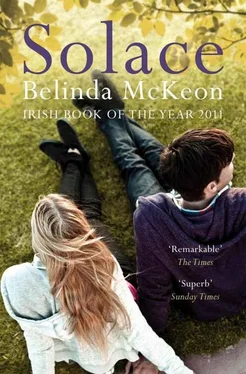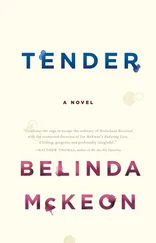Mark heard from his sister now more often than he would have liked. They had little to say to each other, but between them, they worked out a bearable routine. Nuala asked the same questions; he gave the same answers. Nuala asked about their father, knowing that Mark would have talked to him earlier; Mark knew that Nuala would have been talking with him too. She asked about Aoife. She asked how Mark himself was doing. In those first days, those nine days, she had asked about Joanne. But even then, Mark had known that all Nuala really wanted to talk about was their mother. She was panicking, Mark knew. He was going through it too. Trying to claw everything back into view and into focus, trying to recall everything, to preserve it, to have it for keeps — and she was losing it. Forgetting it. Realizing that she could no longer hear, clear in her head, the sound of their mother’s voice. That she could no longer remember the set of their mother’s face. And so every phone call became a clutching after one more memory, one more detail. Had their mother said this that time one Christmas, or had she said that? What did Mark remember of their holidays in Spiddal? What kinds of books had their mother been reading over the last few years? What had she liked to listen to on the radio? Was RTÉ still making episodes of the thing she used to listen to when Nuala was a child?
Harbour Hotel. No. It was long gone. And Mark could not bring himself to look through the pile of books on their mother’s bedside table — still on the bedside table — so he could not answer that question for Nuala. These were, anyway, little things. He knew that. Nuala knew that. But they were the clippings and the shavings and the locks of hair that Nuala needed for the collage she was trying so desperately to make and to control. Sometimes on the phone she would let out a sob, or a sigh that Mark knew to be chased by tears. But usually she was steady, almost chatty, briskly asking and avidly gathering, as though she were doing market research, as though she had a quota of answers to get and spaces to fill. Which she did, Mark knew. As did he. The difference was, he already knew he could not think fast enough, could not hold everything together. Everything had never been held together in the first place. It was gone. The parts were gone. To try to gather them was to try to gather leaves from an autumn five, ten, twenty years ago; there was the sense that countless things had fallen and scattered, but nothing to grasp at, nothing to sweep.
Because Mark was forgetting things too. Already his memory was deciding that some things could be discarded, that some things could fall out of view. On this, his memory was not consulting him. There was nothing Mark felt willing to discard. But it was just one more thing he could not control, and what he could not explain to Nuala was that he felt miles away, even, from being able to worry about that, much less panic about it. None of this was in his control, but some of what he had to get up to, face up to, was more consuming than anything else. And what he had to face up to, every day and every hour, was the fact. And at the fact, Mark felt as though he was still staring, still trying to make it real. Still trying not to be as startled by it every morning as he would have been if he had woken to find a stranger in his room. And so there was no time to cry over what was going, over what was slipping away. The business of being the self that could cry over such things, that could exist after a fact like that and react with sorrow or anger or fear: all of that would have to wait. All of that he could not do. Not yet. He was not yet ready to realize that he was alone.
Alone. He was not alone. He had a father who called him every day, a father he had to call every day. He had a sister. He had friends, who tried to do the kinds of things they thought friends, in such a situation, were meant to do — although some of them vanished, some of them could not face him, call him, text him, even, to say a version of the same old lines everyone felt they had to say. And he had Aoife. A daughter. A child. Sixteen months old, with her mother’s quick, vivid glance. A challenge and an interrogation, meeting with him every morning, looking at him over the bars of her cot. She watched him as he came towards her, she watched him as he walked away from her at night. She watched him as she sat at the kitchen table, as she stood, demanding, beside the fridge. She watched him as she walked, as she wobbled. As she sat in front of the television programmes he hoped she would watch. Before, those programmes had only ever been on for an hour a day. But this was not before. This was now, or this was afterwards, and in now, or in afterwards, he depended on cartoon animals and animated trains for distraction, for relief, for help in spinning the hours into a pale, dulled haze. But she did not watch these programmes, not really. She watched him.
She had three words. The name she called him, which made her sound like a little Dubliner hollering for her da. ‘Boy’, the name for the blanket she carried with her as she walked — it had looked angelic and soft when they had bought it, in its whiteness and its satin and its fleece, but now it looked like a month-old lump of snow. And she had ‘mere’, which meant ‘come here’, which was Mark’s signal to follow her, go to her, take her hand and walk with her to the fridge, the toybox, the staircase, the front door; c’mere, it said, and do what I want you to do. Do what has to be done. Do the thing that has just occurred to me and is full in my mind’s eye as the only needful thing in the world. Look sharp about it. Or be with me as I do it, as I get it, as I turn the dial or climb the step or push the door to make it happen. To make it begin.
He spent his days with her now, mainly indoors. Mainly in the house on Arbour Hill. Because of her, there was need of a routine. He took her for her walk. They came home and ate breakfast. She played, walked through the rooms, waved things at him, gave him her bright, urgent orders. He changed her. For a long time as he changed her, he found himself on the brink of turning to Joanne to make a comment about the smell or the colour of the child’s shit. He found himself, more than once, beginning to turn his head towards the bedroom door, towards the other room, towards the rooms downstairs. As the child watched him look there, she looked there too.
Money was not short. They were fine. The mortgage was long paid on the place. His funding was safe for next year — McCarthy had phoned early on to assure him of that, and what was left would stretch. The money his mother had left him came through in a cheque, and for months he let it sit in a drawer. Eventually he opened a savings account for Aoife. It was something he and Joanne had meant to do. Now the account was there, and it had more money in it than any bank account Mark had ever had, but by the time she used it, he knew, it would pay for maybe a couple of months in America on a J1. Or a second-hand car. Or a master’s in something useless, if they still had degrees in useless things by then. But they would. There would always be degrees in useless things.
*
The Phoenix Park was depressing. Homeless people slept there. Rent-boys worked there. The pope had blessed the country there. Animals lay in filthy cages in the zoo there. But it was a park. It was Mark’s local park. And the park, he decided one morning, was where you were meant to go on your morning walks. Not the square in Smithfield. Not the footpaths along Manor Street. In the park, with trees and greenery and water, and sunlight reflecting off them all. ‘We’re going out to see the sunshine,’ he told Aoife, and she frowned and tugged at his hair.
Читать дальше












